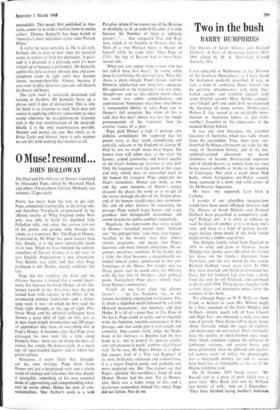NEW NOVELS
Striking platitudes
DAVID HALLIWELL
The Ugupu Bird Slawomir Mrozek translated by Konrad Syrop (Macdonald 25s) Bring Larks and Heroes Thomas Keneally (Cassell Australia 30s) Is Laurence Lerner a good mimic or a poor writer? One's first impression of Peter Metcalf, the narrator of A Free Man, a dullard, slow- witted, humourless and repetitiously boring, suggests that Mr Lerner must have made him so deliberately. But, if so, why? Characters dis- playing all the mental and literary handicaps of Peter Metcalf have been used compellingly by writers like Ring Lardner in the past. But one does not express boredom by boring one's audience. The author must be an intelligent presence between the lines and behind the mumbling.
In A Free Man the author just isn't there. Poor twerp Metcalf has to drone on and on by himself, dull page after dull page, with never a rhythm or a juxtaposition •to help him. Mr Lerner apparently imagines that his hero is quite adequate to get through alone since Metcalf, far from being presented as a drag, is supposed to have a winning way with him. Honest, decent, a bit of a psychologist, a lad quite capable of a poetic phrase or two if absolutely necessary. And frank, yes frank to the point of embarrass- ment sometimes; Metcalf is quite prepared to sleep with any female provided she is easily accessible. But this kind of contemporary move is spatchcocked on to a literary concoction which resembles nothing so much as the boy- scout heroes of polite remainder list romances.
The Ugupu Bird by Slawomir Mrozek is a collection of anecdotes of varying length. Each concerns an oddity of some kind, recounted in a tongue-in-cheek, deadpan style. Whatever deeper meanings these little allegories—if they are allegories—may be supposed to contain it is certain that they are intended to be funny.
There is the case of Count N who could only achieve an orgasm in the right combination of circumstances. Firstly a company of infantry had to pass under his window, secondly a large string orchestra had not only to play but to be present, and thirdly a savage bear had at the climatic moment to appear on an artificial rock. Then there is the man who buys a sheepdog which begins to treat him like a sheep. Every afternoon he has to go out on to the lawn and graze on all fours just to keep his pet happy. Again there is the man who becomes a profes- sional live chessman whilst two senile players move him about.
As can be seen from these examples the ideas in themselves are suggestive and amusing. But the style in which they are expressed and de- veloped is frequently disappointing: often the idea misfires as though Mrozek is missing his own point; some seem to have no point, funny or otherwise. This may be the fault of the trans- lation and it is difficult to know whether the author is to blame. As it stands, in English, the book occupies a twilight position between clarity and obscurity.
A Free Man may be dull reading and The Ugupu Bird bemusing reading, but at least both are reading of a kind. The same can't be said for Bring Larks and Heroes, which I found unreadable. This novel, first published in Aus- tralia, comes to us with a fanfare from its native critics : Thomas Keneally' has been hailed as `Australia's most individual stylist since Patrick White.'
A stylist he most certainly is. He is all style. Perhaps this is wise of him since his material seems to consist of little but platitudes. A plati- tude is a platitude is a platitude until it's been tricked up to become a profundity. Mr Keneally applies his style to every obvious idea and com- monplace event in sight until they become almost incomprehensible. Almost, because if you want to play detective you can still discern the dreary old bones.
The style itself is awkward, disjointed and lacking in rhythms. Mr Keneally beats up a phrase until it dies of dislocation. This is why the book is so tiresome to read. Style does not consist in applying arbitrary contortions to what would otherwise be straightforward. Genuine style is the true manifestation of the material. Ideally it is the only manifestation possible. Manner and matter are one. But when, as in Bring Larks and Heroei, there is only manner we are left with nothing that matters at all.



































 Previous page
Previous page